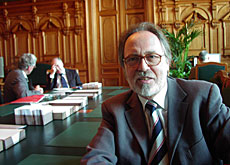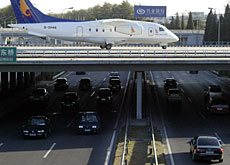The Chinese are coming!

Switzerland is making final preparations for an influx of Chinese tourists, after signing a key deal with the Chinese government.
swissinfo accompanied one of the first reconnaissance missions by Chinese travel agents to the Swiss Alps.
“It’s just like Tibet!” exclaims Ji Peng, a Chinese travel agent, standing on top of Mount Titlis in central Switzerland.
“It gives me energy just watching people skiing. I feel like I’m in paradise,” Ji says as he crouches down to take a picture of a skier gliding past.
Another member of Ji’s group stops a couple of skiers and gestures with her camera. The message is clear, and soon the dozen travel agents are snapping away.
The Swiss press are there too – taking pictures of the Chinese taking pictures.
Whirlwind tour
The whirlwind tour of Switzerland was not only exciting for the Chinese – the Swiss are getting worked up about the potential of the Chinese market.
China granted Switzerland “Approved Destination Status” at the end of last year, which means Chinese citizens no longer have to obtain special permission from their government to travel to Switzerland.
The Chinese and Swiss authorities are currently working out the final details of the agreement (see “In Brief”), which the Swiss say could lead to a threefold increase in Chinese visitors to the Swiss Alps over the next few years.
That would amount to 300,000 overnight stays by 2007, moving the Chinese into second place behind the Japanese among Asian travellers.
Big spenders
Even though the figure pales in comparison with the 12 million nights by German visitors, the Chinese are much bigger spenders.
They spend about SFr400 ($313) a day, which is SFr100 more than the average visitor to Switzerland and SFr300 more than those who stay in holiday apartments or chalets, as Germans tend to.
Shopkeepers in particular are rubbing their hands in expectation of more Chinese customers. Unlike tourists from other countries, the Chinese tend to spend less on accommodation and food, and instead splash out on gifts to take home.
“Expensive accommodation or food is not very important for Chinese tourists,” explains Yang Henghong of Switzerland Tourism’s Beijing branch.
“But shopping is very important because everyone is expected to bring home something for his friends and relatives,” Yang adds.
Rolex watches
“They like buying watches. It can happen that someone chooses to stay in a three-star hotel but purchases two or three Rolex watches during his stay.”
Yang does say however that most Swiss cities and resorts still have their work cut out to tap into the potential.
He says the Swiss tourist industry is not yet providing his office or Chinese agents with sufficient promotional material in Mandarin.
And Switzerland Tourism could soon find itself without the funds to support increased marketing efforts in China, if the Swiss government gets its way and parliament agrees to cut the budget of the national tourist office.
Another problem facing the tourist industry is the absence of direct flights from China to Switzerland.
Chinese food
Swiss hotels and restaurants are becoming more sensitive to the needs of Chinese visitors, but the Chinese travel agents say they have still some way to go.
While Chinese visitors are willing to try European food, they expect at least one Chinese meal a day, which is not always possible in mountain resorts. They are also not used to drinking cold water.
“I think the hotels should provide kettles in the rooms since we are used to drinking lots of tea,” says Ji.
Wu Yi Na from Chinese Mongolia agrees, explaining that one of her colleagues got sick during the tour, blaming it on the cold water.
At the end of their trip, Wu and Ji are tired but impressed with what they have seen after visiting five cities and one mountain in three days.
Wu is going to use many of the pictures she has taken to make new brochures promoting Switzerland among her clients.
“My company promotes a 15-18 day tour of eight or nine European countries,” she explains. “But when I return, I would like to put together a package including just three countries; Switzerland, France and Italy.”
“My European packages normally include 11 countries,” adds Ji. “With my experience now, I would like to offer a tour with Switzerland as the highlight.”
swissinfo, Dale Bechtel in Lucerne
Switzerland Tourism set up an office in China in 1998 but was only granted Approved Destination Status (ADS) last November.
As one of the key conditions attached to ADS, Switzerland has to provide the Chinese authorities with a list of Swiss tour operators who will have permission to work with Chinese travel agents.
These operators, according to Switzerland Tourism, “have to ensure Chinese guests are properly treated”.
Lucerne, Zurich, Geneva, Lausanne and the Titlis cable car company in the alpine resort of Engelberg are most active at marketing in China.

In compliance with the JTI standards
More: SWI swissinfo.ch certified by the Journalism Trust Initiative











You can find an overview of ongoing debates with our journalists here . Please join us!
If you want to start a conversation about a topic raised in this article or want to report factual errors, email us at english@swissinfo.ch.